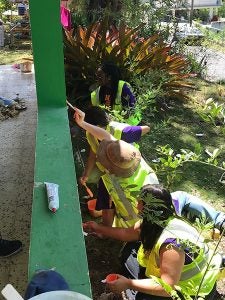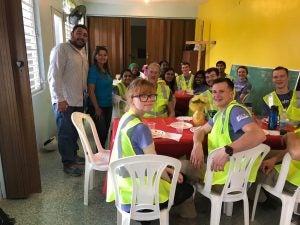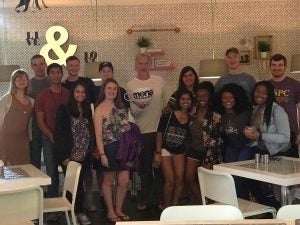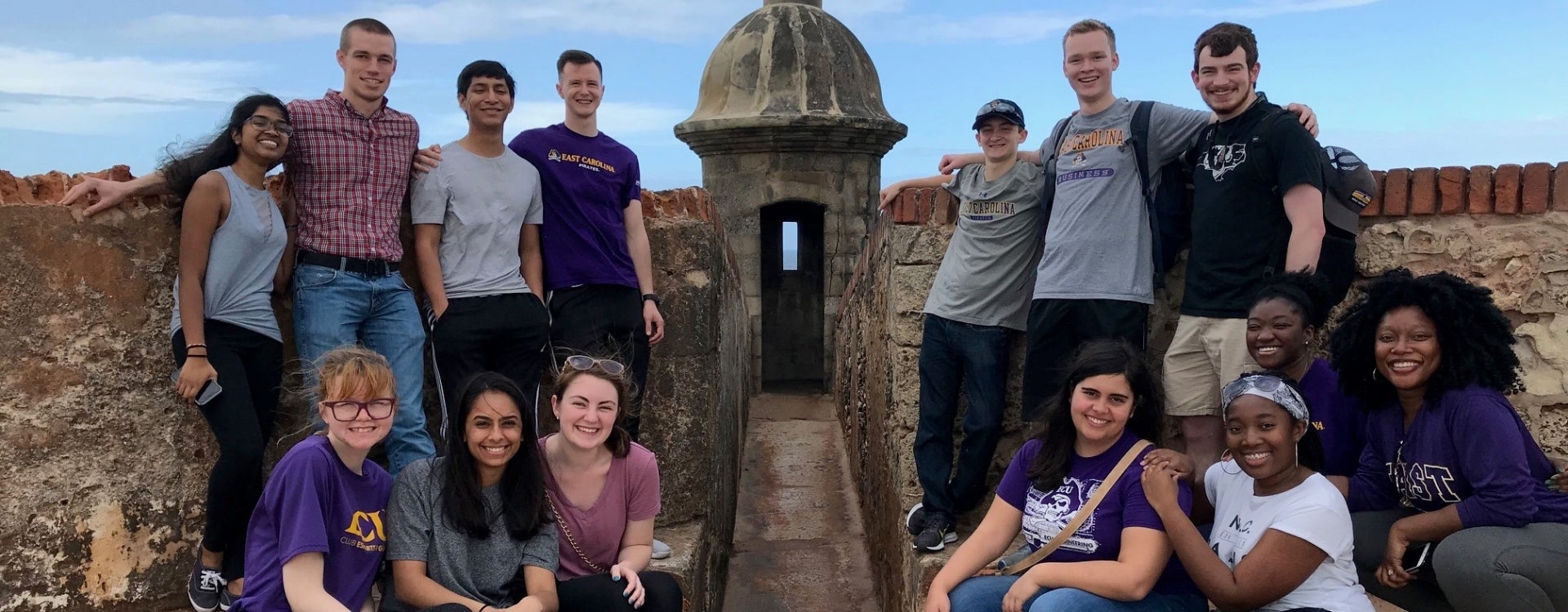Residential Scholars Aid Hurricane Maria Relief Efforts
Scholars Continue Spring Break Service
(Mar. 23, 2018) – Service has been an integral aspect of the ECU Residential Scholars program since its inception in 2010. For the past eight years, the Residential Scholars have spent every fall break in Washington, D.C., engaging in a variety of service projects. This past November, they volunteered with So Others May Eat, an interfaith organization dedicated to supporting residents experiencing homelessness and poverty in the nation’s capital.
Through the Residential Scholars’ fundraising efforts, the group made the first of its three spring break trips to New Orleans in 2015. Among their service projects in the Crescent City was an effort with the nonprofit organization Green Light NOLA to deliver energy efficient light bulbs to low income communities at no cost. This year, the Residential Scholars selected Puerto Rico as their spring break destination.
“The Residential Scholar spring break trips have always focused on exploring a different type of community and culture than what our students usually experience,” said ECU associate vice chancellor for campus living Bill McCartney. “While in New Orleans, we can experience the Cajun and Creole cultures, while also finding ways to continue rebuilding struggling neighborhoods affected by Hurricane Katrina.
“Puerto Rico, with its unique Latin culture and the devastation brought on by Hurricane Maria allowed us to both explore a new place and culture while also completing three days of much appreciated work to help rebuild the existing housing stock in the countryside.”
After flying into San Juan, the Scholars made the three-hour drive to Aguadilla, where they spent the next three days partnering with Stronger Than Maria, a nonprofit organization dedicated to coordinating with local communities as well as government and other organizations to repair and rebuild homes damaged by natural disasters.
 Day one consisted of stripping remaining wood supports from a concrete block house that had just received a new poured concrete roof. Members of Stronger than Maria had earlier built a cement structure around the wood, preserving the original floor plan of the house with a stronger material that will sustain future hurricanes. The house belonged to a single mother with a toddler.
Day one consisted of stripping remaining wood supports from a concrete block house that had just received a new poured concrete roof. Members of Stronger than Maria had earlier built a cement structure around the wood, preserving the original floor plan of the house with a stronger material that will sustain future hurricanes. The house belonged to a single mother with a toddler.
On the second day, the Scholars repainted the exterior of a house that was damaged by the hurricane at the base of the exterior walls and on the ceiling. The group split on the third day, with a small group finishing the house painting and the rest power washing old paint from a safe house for abused women and their children.
“Every one of us had a unique knack that brought something to the table to help with painting. This experience was the most unifying I have felt during group volunteering,” said Celestial Jynx Pigart-Coleman, a junior biology major from Baiden, North Carolina.
Although the effects of Hurricane Maria have long since disappeared from daily news coverage, the damage and devastation to many areas of Puerto Rico remain. Organizations such as Stronger Than Maria, with the help of volunteers such as the ECU Residential Scholars, continue to rebuild and raise awareness of the ongoing need for support.
“This trip illustrated the problems that Puerto Rico still faces after Maria,” McCartney said. “People living in many areas only have access to running water every other day, and this has placed great limits on what repairs and clean up can occur. Electrical access remains a problem in some areas as well. Most tourists do not realize this because the hotels and high-end resorts have full access to utility service to fuel the tourism industry.”
“I was baffled that damage from Hurricane Maria remained even a year after the natural disaster. We were only a pebble in the mountain of repair efforts that have been taking place and will continue to take place in Puerto Rico,” Pigart-Coleman said.
Several of the Residential Scholars were struck by the kindness and generosity of the residents, especially given the difficult circumstances facing them.
 “All the residents and property owners were so kind and hospitable,” said Ananya Koripella, a junior from Cary, North Carolina, majoring in public health and Hispanic studies. “They provided us with lunch all the days we were working there. We were completely surprised with the amount of delicious food they gave us, full homemade meals with different items such rice and beans, a large serving of meat, yucca, and sweet bread for dessert.”
“All the residents and property owners were so kind and hospitable,” said Ananya Koripella, a junior from Cary, North Carolina, majoring in public health and Hispanic studies. “They provided us with lunch all the days we were working there. We were completely surprised with the amount of delicious food they gave us, full homemade meals with different items such rice and beans, a large serving of meat, yucca, and sweet bread for dessert.”
“My Spanish is very limited, so my interaction with the residents were few. However, the interaction I did have with them was very pleasant as they showed so much kindness,” Abby U-Edosomwan – a junior public health major from Charlotte – recalled.
“I found a deep gratitude in a family that cannot afford to repair their house taking time and money out of their day to home cook a meal for volunteers who had full intention to mend their home with nothing in return.” said Pigart-Coleman.
 Reflecting on the trip, several of the students noted the profound lasting effect the experience has had on them.
Reflecting on the trip, several of the students noted the profound lasting effect the experience has had on them.
“This experience has definitely humbled me in many ways. I don’t think we completely understand how privileged we are in comparison to others,” Koripella said. “The best part was seeing the impact of our group effort at the end of the day and knowing that we were the cause of a family’s smiles.”
“I believe it’s important to be culturally aware of the community one is entering, so it wasn’t a shock for me seeing people live in poverty,” recalled U-Edosomwan. “This whole experience has allowed me to appreciate everything that I have even more and not take my comfort for granted.”
“While I worked I kept thinking to myself, ‘Do this better than what you would do for yourself, what I do here is going to last’ and those words resonate with me still even as I sit in my classes today,” said Pigart-Coleman.
Established in 2010, ECU’s Residential Scholar program was founded to reward and encourage students to become active members of their campus and local community. Each year, the program awards 20 upperclassmen $4,000 toward on-campus housing expenses.
